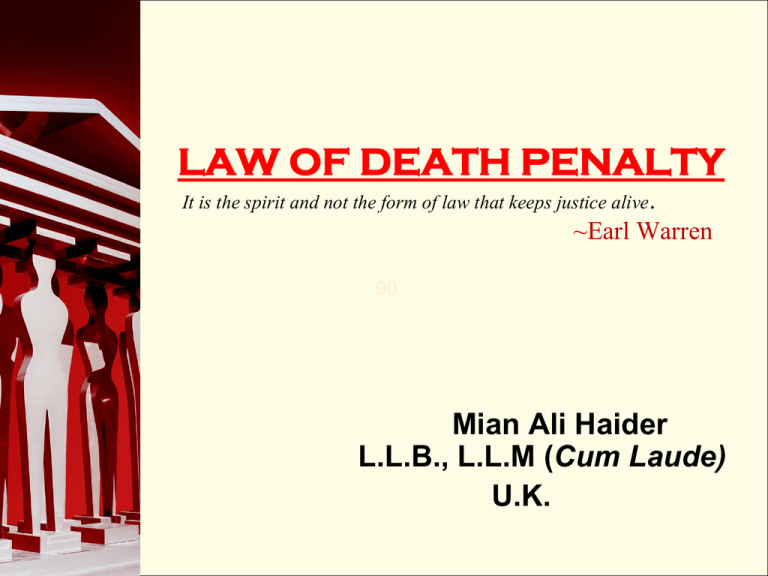Law of Death Penlty
advertisement

LAW OF DEATH PENALTY It is the spirit and not the form of law that keeps justice alive. ~Earl Warren 90 Mian Ali Haider L.L.B., L.L.M (Cum Laude) U.K. INTRODUCTION • It is a commonplace among anti-death penalty activists to state that the world is on the brink of universal abolition. • Indeed – and without being too effusive – the use of the death penalty has decreased 90 dramatically since the entry into force of the International Covenant on Civil and Political Rights (ICCPR) in 1976. • In which the death penalty is carefully formulated as an exception to the right to life. HISTORICAL BACKGROUND • Since 1976, the concept of exception to the right to life has been more fully elaborated, and has become more specific, narrowing the scope of the applicability of the death penalty by imposing limitations on who it is permissible to execute and under what conditions. 90 • Exception – – juvenile offenders, the mentally ill – pregnant women the elderly. • Further elaboration of the concept of exception has resulted in strengthened procedural safeguards and progressive restrictions on the number and nature of serious crimes for which the death penalty may be applicable MOST SERIOUS CRIMES • The legal basis for judicial executions in international law is found in Article 6 of the ICCPR, which addresses the right to life. Paragraph 2 introduces the formulation “most serious crimes” – “In countries which have not abolished the death penalty, sentence of death may be imposed only for the most serious crimes in accordance with the law in force at the time of the commission of the crime […] 90 6 is open to wide interpretation. • The formulation of Article – The notion of “seriousness” may vary according to national culture, religion, tradition and political context. – However, a relativist approach is problematic as it potentially undermines the concept of universally applicable normative principles in international law. – In the spirit of universality, Article 6 sets the direction towards abolition of the death penalty by establishing state obligations to progressively restrict its use MOST SERIOUS CRIMES • According to the Safeguards Guaranteeing Protection of the Rights of those Facing Execution of 1984 (ECOSOC Resolution 1984/50), the scope of the death penalty – “should not go beyond intentional crimes with lethal or other extremely grave consequences”. • In sixth quinquennial report, the UN Secretary-General stated that the above statement 90 – “is intended to imply that the offences should be life threatening, in the sense that this is a very likely consequence of the action”. • In 2006, the UN Special Rapporteur on extrajudicial, summary or arbitrary executions further narrowed the interpretation of “most serious crimes” by defining them as: – “cases where it can be shown that there was an intention to kill, which resulted in the loss of life” RETALIATION • Despite this global trend, a minority of states have continued to show some resistance to the restrictive interpretation of “most serious crimes”. • For instance, Nigeria challenged the UN Special Rapporteur on extrajudicial, summary or arbitrary executions, arguing that – The notion that executions for offences such as homosexuality and lesbianism are excessive is judgemental rather than objective. What may 90 be seen by some as disproportional penalty in such serious offences and odious conduct such may be seen by others as appropriate and just punishment • Furthermore, the note verbale of disassociation signed by 53 UN member states in response to the 2010 UN General Assembly resolution entitled “Moratorium on the use of the death penalty” takes a similar line, stating that – [T]he types of crimes for which the death penalty is applied, should be determined by each State, taking fully into account the sentiments of its own people, state of crime and criminal policy • Jurisprudence from a wide range of sources has brought some clarity to the question of which crimes can legitimately be classified as the “most serious”. • For this lecture I have taken the definition of “most serious crimes” proposed by the UN Special Rapporteur above –90namely offences with intent to kill resulting in loss of life • The UN and other international human rights bodies have advocated a progressively restrictive interpretation of offences which meet the threshold for “most serious crimes” and have sought to clarify the nature of offences which do not do so CRIMES AGAINST THE STATE AND MILITARY CODES • Most retentionist and a few other states that have abolished the death penalty for ordinary crimes, retain the death penalty for certain political offences. • Including offences against the state and public order, violations of military law in time of war, and for “terrorist” acts and acts 90 of treason. • Some of these offences may involve loss of life and could therefore be construed as intentional murder. • But many are so broadly defined that the death penalty can be imposed for a range of offences that do not meet the threshold for “most serious crimes” identified above. • Some could be described as political offences CRIMES RESULTING IN DEATH • In some retentionist countries, serious crimes (or felonies) like arson, aggravated assault, burglary or robbery resulting in loss of life are punishable by death. • Felony murder 90– where a killing was unintentionally committed during the commission of another crime – is also defined as a capital offence by some states. • These crimes do not necessarily meet the “most serious crimes” threshold since loss of life may occur without actual intent to kill DRUGS OFFENCES • Drugs-related crimes for which the death penalty can be imposed include possession, production, trafficking or use of illicit narcotics. • Generally, whether a person is sentenced to death or not depends on the type and quantity of drugs involved. 90 • In some countries possession of even a small amount of an illegal substance is punishable by death while in other countries drug possession per se is not a capital offence but may be construed as drug trafficking and hence subject to the death penalty OVERALL DP IN LAW AND PRACTICE IN RETENTIONIST COUNTRIES • While international law progressively restricts the use of the death penalty to offences meeting the “most serious crimes” threshold, it is still applied for a wide range of offences in some countries. • In many states which retain the death penalty there are capital crimes which90do not meet a restrictive definition of “most serious crimes”. • Available data suggest that the majority of executions would not be carried out if states adhered to a strict interpretation of “most serious crimes”. • In Iran, for example, it is estimated that more than 80 per cent of executions do not meet the international threshold for “most serious crimes” OVERALL DP IN LAW AND PRACTICE IN RETENTIONIST COUNTRIES • In China, despite some welcome reforms, the death penalty is still imposed for non-lethal crimes • Malaysia many of those on death row have been sentenced for drugs offences. 90 • Other countries define adultery, apostasy, armed robbery or gang robbery and sodomy as capital offences. • In contrast, in the English-speaking Caribbean, despite a fervent belief that capital punishment deters crime, in practice the death penalty is only imposed for murder and executions are rarely carried out. • Despite this global trend some countries maintain that capital punishment deters crime and therefore can and should be imposed for a broad range of crimes even when there is no intent to kill or actual loss of life. • This position runs counter to international law, most particularly the right to life and the narrow exceptions to that right • Among the most common 90 arguments in favour of the death penalty is the Utilitarian argument that it acts as a deterrent for potential criminals: death penalty would “set the example”, as it would reduce crime, while supposedly protecting society from its most dangerous elements. • These oft-repeated arguments have been empirically proven to be baseless • Systematic studies undertaken in a number of different countries show that imposition of the death penalty does not contribute to a reduction in the crime rate • In Pakistan, similar studies have shown the crime rate to be rising, in spite of the death penalty being in force and systematically applied • The inference can be drawn that societies which apply capital punishment are no better protected from crime than societies which do not, where other sanctions are available in order to protect society, notably imprisonment • The most recent survey 90 of research on this subject, conducted by Roger Hood for the United Nations in 1988 and updated in 2002, concluded that – “the fact that the statistics... continue to point in the same direction is persuasive evidence that countries need not fear sudden and serious changes in the curve of crime if they reduce their reliance upon the death penalty” • All studies show that the deterrent factor is the certainty of conviction, not the harshness of punishment • Already backed in the 18th century, Cesare Beccaria noted that, 90 – “it seems absurd that the laws, which are the expression of the public will, and which hate and punish murder, should themselves commit one, and that to deter citizens from murder, they should decree a public murder” RETENTIONIST ARGUMENT No.1 • Those who claim that it is a matter of national sovereignty and is not related in any way to human rights law; • China, Singapore and some of the Caribbean states fall into this category. China has stated that – ‘each country should90decide whether to retain or abolish the death sentence on the basis of its own actual circumstances and the aspirations of its people’ • When Trinidad and Tobago withdrew from the American Convention on Human Rights, it stated – ‘the death penalty is not a human rights issue’. • Singapore made a similar statement during the negotiation of the Rome Statute for the International Criminal Court RETENTIONIST ARGUMENT No.2 • Those who claim that it has a deterrent effect and is necessary for controlling crime; • It is often argued that the death penalty deters crime and prevents re-offences. • However, these claims are not supported by 90 any recognised studies, and many countries that adopt a moratorium prior to the final abolition of the death penalty find that the death penalty does not have a deterrent effect in practice. RETENTIONIST ARGUMENT No.3 • Those who claim that it is required under their religion, and particularly in accordance with Islamic principles • Islamic states argues that the death penalty is required under Islamic law. • However, this position is not supported by a number of Islamic international90lawyers, and apparently also by some Islamic states that have abolished the death penalty. • While apostasy requires the death penalty (unlike other offences, where it is recommended only), some Islamic scholars consider that this mandatory status was only where the person had waged war against Allah and where their actions had resulted in a homicide. RETENTIONIST ARGUMENTS • In addition, of the fifty countries in the world with a Muslim majority, only 32(64%) retain and impose capital punishment. • In practice, it tends to be the least democratic and most repressive states that retain and use the death penalty. 90 tempered by the darura, the • “Islamic law is also doctrine of necessity, which allows the Shari’a to be ignored when necessary under the circumstances. It is arguable that the international environment is increasingly creating such a necessity as the death penalty becomes unacceptable” – M Cherif Bassiouni, ‘Death as a Penalty in the Shari’a’ The Death Penalty: Condemned (International Commission of Jurists: Chatelaine, 2000), 65-84, 73-77. CONCLUSION • International law is clearly moving towards disallowing the death penalty and this is continuing apace • The primary human rights treaty, the ICCPR, encourages states to abolish the death penalty, and the Human Rights Committee has supported this encouragement with strong statements promoting abolition • International custom is also becoming increasingly abolitionist, 90 the death penalty as being inconsistent with more states regarding with human rights standards. While the death penalty remains legal at international law at the current time, it is highly likely that progress towards abolition will continue • Arguments in favour of retaining the death penalty often appear to rely on unproven allegations, such as its deterrent effect, or focus solely on the argument that the decision to abolish or retain capital punishment remains within national sovereignty. Additional arguments relying on religious or cultural grounds appear to be criticised when investigated in-depth, and have not prevented other nations from abolition








